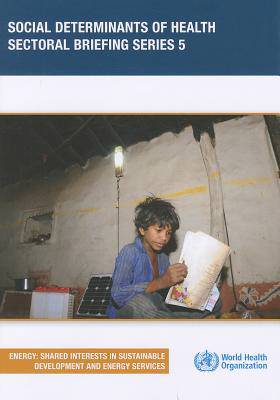
- Afhalen na 1 uur in een winkel met voorraad
- Gratis thuislevering in België vanaf € 30
- Ruim aanbod met 7 miljoen producten
- Afhalen na 1 uur in een winkel met voorraad
- Gratis thuislevering in België vanaf € 30
- Ruim aanbod met 7 miljoen producten
Zoeken
€ 27,45
+ 54 punten
Omschrijving
Energy is a resource that connects economic growth, social equity and sustainable environment. Development is not possible without sustainable energy. It plays a critical role in society, affecting the economy, international trade, national security, and the human and physical environment. Energy policy is a basic condition for economic and industrial development; it is equally critical for health. However, we are living in a world where millions of people still live without a reliable source of energy in spite of modern technology. Ensuring universal and sustainable access to modern energy sources for all is therefore another development imperative that plays a crucial role in effectively reducing poverty and providing health for all.
This briefing describes the energy sector, its public policy challenges, how the sectors tries to address these challenges, and areas for potential collaboration between health and energy.
The briefing has been structured to permit public health practitioners with limited time to obtain a well-rounded perspective of the topic by reading only sections 1 and 3. The three sections are:
1. Energy sector overview. This covers mutual interests that both sectors share, global trends in energy, and policy challenges from the perspective of the energy sector characterized as goals. These goals are proposed as a result of a review of policy documents and from interviews with energy sector practitioners in order to consider different country contexts and realities.
2. Goals 1 to 4. The second part of the briefing analyses each goal, with a detailed description of policy approaches, health impacts, and areas for potential collaboration between sectors.
3. Summary messages. Presents key messages with respect to equity, the role for health, and examples of areas for collaboration.
This briefing describes the energy sector, its public policy challenges, how the sectors tries to address these challenges, and areas for potential collaboration between health and energy.
The briefing has been structured to permit public health practitioners with limited time to obtain a well-rounded perspective of the topic by reading only sections 1 and 3. The three sections are:
1. Energy sector overview. This covers mutual interests that both sectors share, global trends in energy, and policy challenges from the perspective of the energy sector characterized as goals. These goals are proposed as a result of a review of policy documents and from interviews with energy sector practitioners in order to consider different country contexts and realities.
2. Goals 1 to 4. The second part of the briefing analyses each goal, with a detailed description of policy approaches, health impacts, and areas for potential collaboration between sectors.
3. Summary messages. Presents key messages with respect to equity, the role for health, and examples of areas for collaboration.
Specificaties
Betrokkenen
- Auteur(s):
- Uitgeverij:
Inhoud
- Aantal bladzijden:
- 30
- Taal:
- Engels
- Reeks:
- Reeksnummer:
- nr. 5
Eigenschappen
- Productcode (EAN):
- 9789241506199
- Verschijningsdatum:
- 6/02/2014
- Uitvoering:
- Paperback
- Formaat:
- Trade paperback (VS)
- Afmetingen:
- 203 mm x 292 mm
- Gewicht:
- 136 g

Alleen bij Standaard Boekhandel
+ 54 punten op je klantenkaart van Standaard Boekhandel
Beoordelingen
We publiceren alleen reviews die voldoen aan de voorwaarden voor reviews. Bekijk onze voorwaarden voor reviews.











